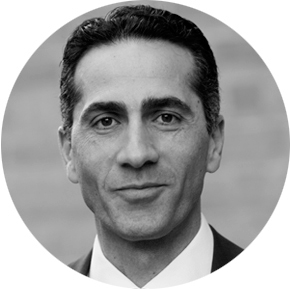Foundation for Armenian Science and Technology (FAST) is preparing for its first event to be held in Yerevan in October. On the eve of that Mediamax talked to FAST CEO Armen Orujyan to explore what he wants FAST to become in next 5, 10 or 15 years.
Armen Orujyan, PhD, is the Founder and Chairman of Athgo Corporation, one of the world’s leading entrepreneurship platforms in consultative status with the UN Economic and Social Council, UN Department of Public Information, and the World Intellectual Property Organization.
In 2006, Armen joined the UN’s Global Alliance for ICT and Development (GAID) as a Founding Member. Under the auspices of the Chief Information and Technology Officer of the UN, he was appointed by the Secretary General of the UN and served through 2013 as co-Chairman of GAID. He was also named a UN e-Leader for ICT and Youth and selected as one of top under-40 young leaders by Asia Society. Armen further served as a Commissioner on the UN’s venerated Broadband Commission for Digital Development through 2015.
In 2017, Armen joined Rice University’ Baker Institute for Public Policy as a Member of the Board of Advisors. He is also a Managing Partner of Ignited Spaces, one of the fastest growing on-demand creative studio and office spaces in Los Angeles.
Meeting Ruben Vardanyan and getting the offer to lead FAST
It started in summer 2016, when Ruben [Vardanyan] and I had our first discussion ever. When he learned that I hadn’t been to Armenia for nearly a decade, he invited me to come and see some of his work, IDeA Foundation particularly.
I took up on his offer and I came in late February this year. I was just blown away by what IDeA’s been doing, the projects that are in pipeline and the UWC Dilijan College. If you take that facility and put it doesn’t matter where in the world, it’s just going to be impressive regardless. Its mission is also impressive and the people that work there are fascinating.
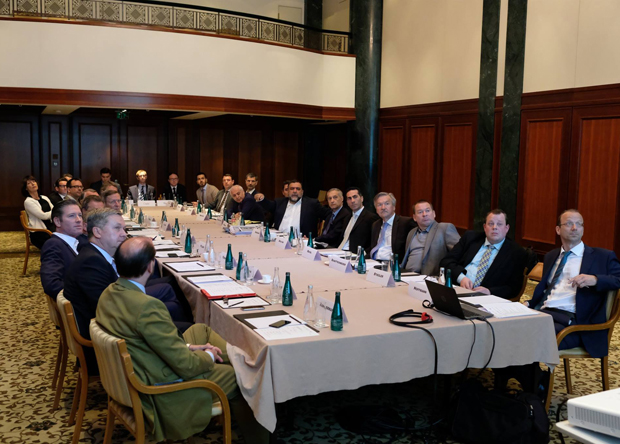 Armen Orujyan and Ruben Vardanyan at the meeting with German businessmen
Armen Orujyan and Ruben Vardanyan at the meeting with German businessmenPhoto: FAST
I went from one end of the country essentially to the other by going to Tatev. Seeing the transformation of the monastery, what the air tram had done, I was very impressed.
Ruben’s upcoming plans were also extraordinary, including his ideas on science and technology, so he spoke to me about FAST. He then followed up by sending me some additional material, I read through it, and then we met up the following month in New York to continue the discussions. I think that was the first time when the conversation about “How do you feel about possibly leading this initiative?” took place. I met all of his partners that were part of the FAST initiative and other stakeholders, all of whom I found to be remarkable people. That brought this assurance that it can be done with these people. Everything in the world is about people anyway. You take the people out and there is nothing to rely on. Having these people in the game, with their skin in the game, was really reassuring.
In March I said “let me try this for six months, let me take your ideas and translate them into some kind of framework”. We will design a road map for six months and I will bring my own time and resources in this.
Falling in love with FAST
I’m kind of falling in love with this initiative. It’s like a dating season for me. What the project could do to Armenia, this region, and possibly even globally – an impact of it is just monumental. To have an opportunity when you essentially have a country as the sandbox, when it comes to science and technology…
Not to diminish what the country used to have back in the Soviet days – the culture, the experience, but that’s long gone. There’s remnants of that, everything almost needs to be started from the ground. But there are signs that if you really focus here, you can get things done. If you put your resources and your mind into it, it will be done in various aspects of science and technology. It’s an exciting opportunity. I’m really privileged and fortunate to be part of this.
Lips move less and my ears active
One critical aspect is to have my lips move less and my ears be active so I can learn. I already stated I haven’t been to Armenia for nearly a decade, but even if you live here full-time, without really trying to explore the fundamentals, to try to understand, to feel the nature of the beast you’re dealing with, it is not enough to know the entire terrain. You need to dig very deep into the foundation, go as deep as possible into the vertical, and that’s my primary goal.
I’ve been meeting with everyone you can meet in the field, from laboratories to universities and the Science Committee. The Vice Chair of the committee is on our Board of Advisors, which makes the meetings process easy.
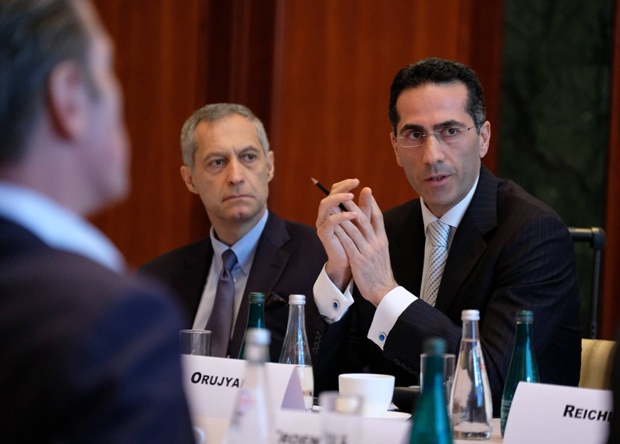 Armen Orujyan
Armen Orujyan Photo: FAST
There are some areas that are very well-preserved and you would want to leverage those, and there are those where science will progress if you give a little nudge. We’re looking for those types of opportunities, we want to see where you actually have this, what you can leverage. The Science Committee is willing. They want improvement, progress, and I think they’re welcoming our collaboration with them. It’s very important for us not to ever ignore anyone in the field, but to really understand what their capabilities are and how we can actually leverage those capabilities.
We have a team that does our own intensive research and I like moving forward with scientific data in front of me. I’m very data-driven, very logic-driven, I try not to do things emotionally.
Facility, equipment, people, and culture issues
I’ve noticed four inadequacies in my exploratory work, and not necessarily in the same order – issues with facilities, equipment, knowledge, and culture. If you go to a place that has all these four issues in one place, it would be very difficult for you to try to move forward. You’ve got to pick and choose your battles because no one has unlimited resources, and nor do we. We have limited resources and time and we want to make sure that the time and resources we spend are spent at places where we can actually coordinate the resources and be the locomotive to push it forward.
Some of these places have none of the issues, but many do. It’s like you’re walking into last century with some facilities and it really is last century because some of the facilities and equipment are from 50s and 60s and nothing has changed since, including people that work there. When you have facility, equipment issues, it’s the easiest ones to resolve because you throw money at it and you fix it.
Whenever you have knowledge issues, and I mean informational gaps, it’s something you can acquire, you just need to educate, repurpose, retrain, etc.
Culture is the most difficult one, because culture is a generational effort that you need to exert for you to be able to change that. Those are the ones that could expend a lot of your resources and time if you try to go in all those four directions.
FAST objectives are holistic
FAST objectives are holistic. We want to elevate the entire ecosystem, to create an ecosystem that will drive technological innovation, and scientific advancement. In order to do that, you would need to target all the significant capacities – intellectual, financial, network capacities – and create a tsunami that brings in a wave after a wave and lifts these capacities, building the ecosystem that will allow scientists, entrepreneurs, and everyone else to play a role and benefit.
If we spend a minute on financial capacity, think of an environment. Think of this: you have angel networks in this small environment, you have venture capital that looks at early stage and later stage funding, you have private equity funding, alternative investment funding, all sorts of grants for specific scientific areas that you would want to enhance, fellowships for PHDs. If you wake up to an environment that has all of these in the financial capacity side, you have most of the necessary tools in place. It makes a tremendous change in thinking and calibrating, for people, science, technologies, for those who are looking into Armenia from abroad and thinking, “Is this an investable place we would want to go?”, but also for students, the younger generation to look and say, “Is this the place for us to give our time and resources, knowing that we will come out and be able to actually grow in this environment? Or should we get to a point where we obtain a little bit of knowledge and then we get out of the country?”
We look at it from that perspective. On the intellectual side, we’re looking at labs, innovation camps, institutes, institutions, what could be established and what we could do. So when we look at this, there are long-term objectives within those and there are short-time wins that can come out.
Short-time wins
A short-time win for us is that in October we’re going to unveil a fellowship for PHDs in applied biological and physical sciences, math, and engineering. What we’re planning to do is to support top 10% of PHD students in Armenia in the areas I mentioned. That would be a small win because what we want to do is fund full tuition, full stipends and bring stipends at a point where the students aren’t going to look for secondary opportunities, jobs, and simply focus on their PHD.
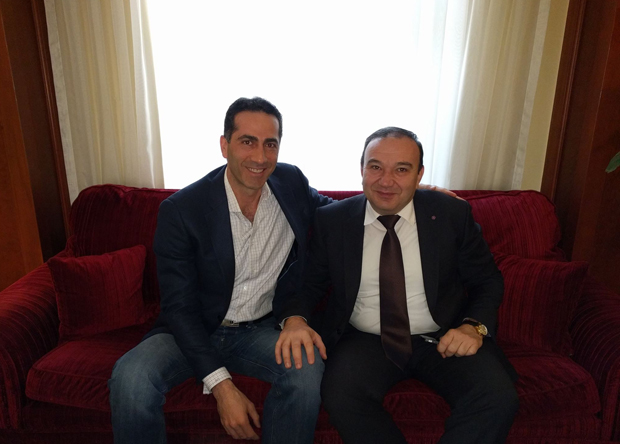 Armen Orujyan and Armenian Science and Education Minister Levon Mkrtchyan
Armen Orujyan and Armenian Science and Education Minister Levon MkrtchyanPhoto: A. Orujyan’s archive
Those of us that have gone through the process of getting a PHD, we know what type of a process it is. It takes a lot of time, effort, and focus for you to actually excel. We want to provide that type of opportunity for these young people here in Armenia. So, that would be first stage and we are going to announce it that we’re going to fund top 10% and top 10 women scientists in that space as well. That’s a short-term opportunity that we’re going to bring to the ecosystem.
Long-term goals
As for long-term, one anchor program that we’re working on is a regional open innovation campus. It’s a physical facility that is a microcosm of a functioning ecosystem. If we put it in some kind of a structure that takes you through one stage to another – think of a conveyor belt that on the ground floor has an experimentation area that will focus on specific priority science areas where we want to put time and resources.
For instance, data sciences will be an anchor project for us, an anchor vertical that we will focus on. That along with biotechnology, drones and robotics, new and advanced materials will be in the experimentation area with labs that will have cutting-edge technology, knowledge base, people with deep expertise that will actually be able to impact our students here.
From experimentation you go to another level, which is an incubation area. Some of these findings from experimentation area could graduate into incubation, but it’s not only for that. Anyone from outside could come into this space as well.
From incubation you go to acceleration, then to customer experience for the market and people to come in and see the products and how they can benefit from them, and last, social clusters, where inventors and scientists could come together, meet up and perhaps come up with new ideas. We’re looking at establishing something of that nature, a microcosm of an environment that is fully functioning and has all the intellectual capacity required, all financial capacity such as an angel network, crowdfunding elements, and other financial tools that could support these innovators and scientists.
But it’s not only for Armenia. We foresee a regional hub. If Iranian scientists or students would want to go to a place that offers cutting-edge science and technology, they will also consider coming to Armenia. Draw top-notch experts from the region – Russia, Eastern Europe, Bulgaria, Romania, etc, create an establishment of that nature. We’re looking into building something of that nature in the next two-three years or so.
It’s not exactly long-term, we have some long-term projects, let’s say, establishing Moonshots labs, something similar to Google X, or building 8 at Facebook that looks at solutions that aren’t going to be commercialized in the next five or ten years. The solutions from these efforts could take up a decade or fifteen years to materialize. This is very intriguing, but that’s something we’ll touch later.
Incremental and transformational innovations
Innovation happens two ways: incremental innovation and transformational (or revolutionary) innovation. Incremental innovation is easier to process, that happens all the time. In incremental innovation you have traditional funding sources. For transformational, you require distinct set of tools, because for those becoming a reality takes a different sort of an effort, and whether they will become real or not is questionable.
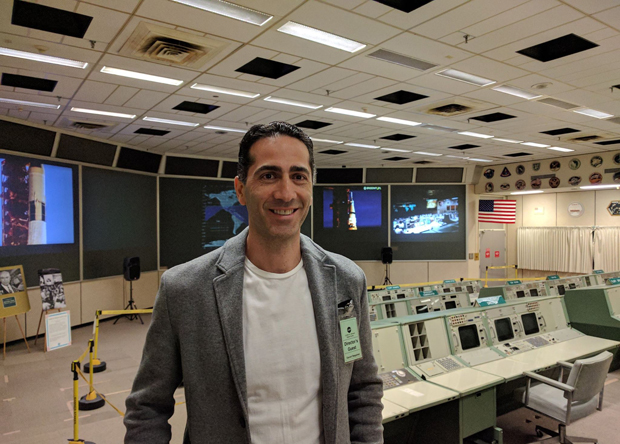 Armen Orujyan
Armen Orujyan Photo: A. Orujyan’s archive
There’s a an interesting group out there called X-PRIZE Foundation based outside of Los Angeles, California. In early 2000s they put out the Ansari X prize for privately built reusable spacecraft. I don’t remember exact details of the project, but it was something of this nature – for you to be able to go to the edge of space, stay there (I think it was 100K altitude) for about 5 minutes, come down and then repeat that two weeks later. The winner would walk away with USD 10 million. Things like XPRIZE Foundation’s prize on this privately designed rocket was the emphasis that today we have entities like Virgin Galactic (actually, Richard Branson bought one of those competitors), SpaceX, Blue Origin by Jeff Bezos. It essentially created a new industry, a new field. We would want also to participate in things of that nature ourselves as well, to drive innovation toward the edge of market. We’re not prepared to do so today, but that would be something long-term for us.
Government’s engagement
We sat down with the President of Armenia and I presented the road map as to how we want to move this forward, the framework that we want to apply. He was very complimentary to what we’re trying to do and he endorsed it. It was very pleasant to see that he actually took his time, asked many follow-up questions, just trying to clarify and understand what it is that we’re trying to do, and it was reassuring. The reason I bring up government is that none of this can actually happen if the government doesn’t play a role. Many of these elements require government’s engagement.
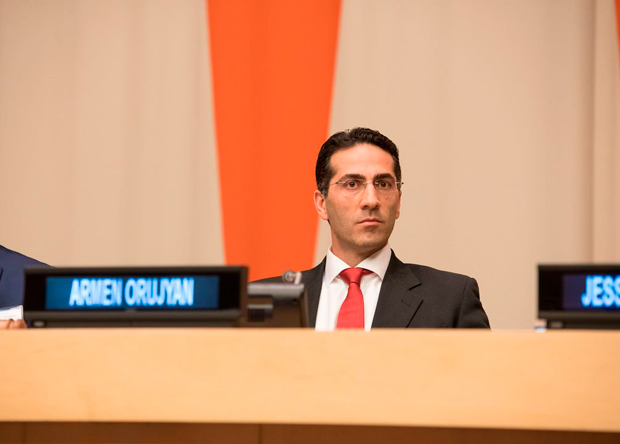 Armen Orujyan
Armen Orujyan Photo: A. Orujyan’s archive
Provided that we have the fortune of the government going parallel with us, and we don’t need that much from them, to be honest with you, what we need is to relax regulations in some of the areas that we’re trying to go and explore, to enable us to create innovation districts where we can do rapid prototyping on a massive scale. Let’s say, go to Dilijan, take all the traditional traffic lights out, bring autonomous cars as a testbed for the next eighteen or twenty-four months, bring automotive companies to build the necessary infrastructure. Also companies like Amazon to bring their drone delivery technology and shut down the air traffic to test local deliveries, and the blockchain technology for us to test how digitizing property rights would work in Armenia – in one city or nationwide, regionally, and beyond that; also turn some of the cities into 100% renewable energy users.
Government could be very helpful and resourceful when it comes to enabling us to do some of these experiments.
Explore and experiment
You don’t learn math by immediately figuring out that two times two is four. You make a lot of mistakes before you actually get there. Humanity would have never progressed if we didn’t continuously explore and experiment. We could use government support in helping us to prototype many of these initiatives. So, with the government coming in to play that type of role, ten years down the line we’re looking at a very different country. We can build massive new technological solutions that are not only applicable to Armenia.
I could see Armenia leading in certain areas of science, such as data sciences, biotech, or more vertical expertise in synthetic biology, artificial intelligence, ML, and things of that nature. In ten years we can create a specific niche where Armenia shines the way Armenia shines let’s say in chess, being a small country but being able to produce outstanding impact.
We’re not an Advil, we’re more of an antibiotic
I would not look at FAST as a foundation. I would look at it more like a developmental institution. To put it in a medical term, I would say we’re more of an antibiotic rather than a quick relief, an Advil. Most headaches don’t start in your head. They are due to a malfunction somewhere else in your body. Yet, when you have a headache, if you take an antibiotic, you feel absolutely nothing, your headache still continues, so you take an Advil, for a quick relief. Headache is temporarily gone, yet the real problem persists.
FAST’s real impact is not going to be felt within twenty minutes. I’m not interested in quick impact, I’m looking for an antibiotic type of solution. We may not be as visible as others in that space and I really don’t care to be visible. We’re not a Hollywood blockbuster. I’d rather that no one notices that we exist as long as we’re successful, as long as we are that antibiotic.
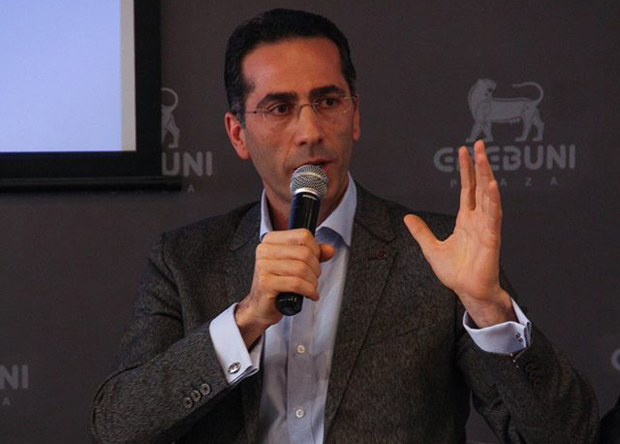 Armen Orujyan
Armen Orujyan Photo: A. Orujyan’s archive
For that antibiotic to have an effect, it’s almost like we need a cocktail of things. We need IDeA Foundation, Luys Foundation, Aybs, and Tumos – we need all of these guys to play their own role and continue doing what they do. But we also need our team: Ruben Vardanyan, Fr. Mesrop Aramyan, Noubar Afeyan, Arthur Alaverdyan and our Board of Advisers. These monumental people who are doing incredible things, bringing everyone’s efforts together, all of this is going to take time. All of this is going to make our efforts more intriguing, interesting, more impactful. We put all of these collective efforts together – what Ruben and his team are doing at IDeA, what all of these people are doing separately - and then bring us collectively into what FAST is going to do, and then we fast forward and the year is 2027.
Neighbors will be looking at us differently
We have the capability, we have all the tools and resources in place and the people in place, and we can see Armenia that is significantly different than it is now. Some of the issues that are threatening the security of this country may be alleviated by the weight that we’d carry around the world by becoming a leader when it comes to science and technology. I think our neighbors will be looking at us differently. We can reach out and support some of these people to better understand the situations and us, to understand what it takes to operate and be a peaceful society, what helps you grow in peace rather than in conflict, what it means for you to have friendly and brotherly neighbors.
I think we can be that society, the nation that brings that to this region. We’re not relying on larger countries to show us a roadmap. We’re an old nation, we are people that have seen, built, created. We should be able to display and demonstrate this ourselves without relying on other nations to do it on our behalf. That’s what I would want to see, even if we haven’t accomplished everything that I just said, at least, to clearly understand that we are on the right path. We just need to attempt. Enter FAST!
Ara Tadevosyan talked to Armen Orujyan









